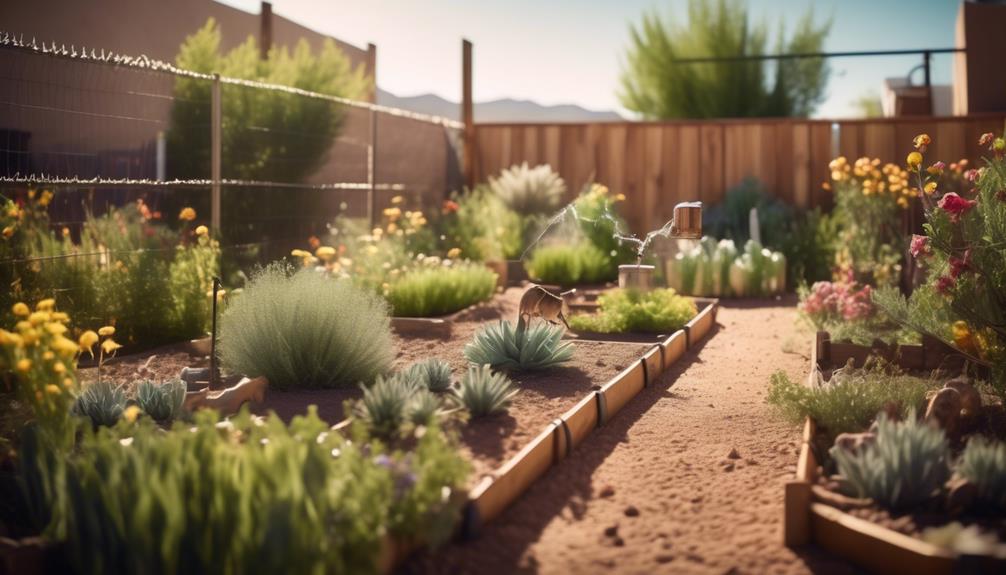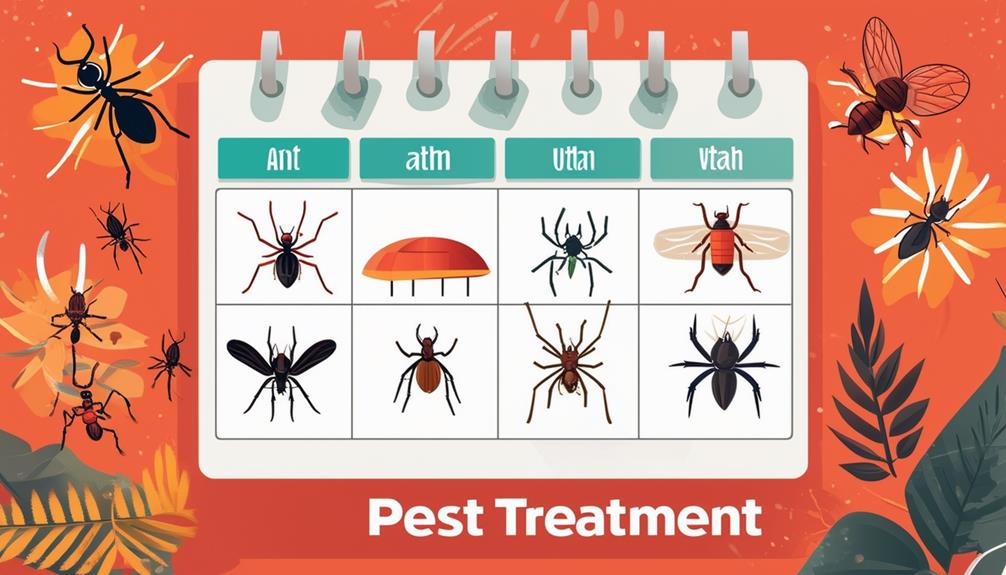Did you know that St. George, Utah, is home to a variety of garden-damaging rodents? From sneaky mice to persistent gophers, these creatures can wreak havoc on your hard-earned plants and vegetables.
But fear not, because in this discussion, we will explore effective strategies for rodent-proofing your garden. By understanding rodent behavior, identifying common garden rodents, and implementing natural deterrents and physical barriers, you can create a safe haven for your plants.
So, if you’re tired of seeing your efforts go to waste, keep reading to discover the secrets to maintaining a flourishing, rodent-free garden in St. George.
Key Takeaways
- Rodents communicate through vocalizations, body language, and scent marking, which can help in detecting their presence in the garden.
- Common garden rodents in St. George, Utah include mice, rats, squirrels, and gophers, each with their own unique characteristics and behaviors.
- Natural rodent deterrents such as peppermint oil, garlic bulbs, and crushed red pepper flakes can effectively keep rodents out without using harmful chemicals.
- Physical barriers and exclusion methods like fencing, burying fencing, and using wire mesh or netting can prevent rodents from entering the garden and causing damage.
Understanding Rodent Behavior
When it comes to rodent-proofing your garden in St. George, Utah, it’s essential to understand the behavior of these pesky critters.
One key aspect of rodent behavior is their nesting habits. Rodents such as mice and rats tend to build nests in secluded areas that provide them with warmth and protection. Common nesting spots include burrows, attics, and even the insulation of your home. By identifying and blocking these areas, you can prevent rodents from making themselves at home in your garden.
Another important aspect of rodent behavior is their communication methods. Rodents use various methods to communicate with each other, including vocalizations, body language, and scent marking. Understanding these communication methods can help you detect the presence of rodents and take appropriate measures to keep them out of your garden.
Identifying Common Garden Rodents
To effectively rodent-proof your garden in St. George, Utah, it’s crucial to be able to identify the common garden rodents that may pose a threat to your plants and crops. By recognizing these pests, you can take appropriate measures to control and eliminate them.
The most common garden rodents in this area include mice, rats, squirrels, and gophers. Mice are small and can fit through tiny openings, while rats are larger and more aggressive. Squirrels are known for their ability to climb trees and steal fruits and nuts, while gophers are burrowers that can cause significant damage underground.
Signs of rodent infestation include droppings, chewed plants, gnaw marks on wood, and tunnel systems. Understanding these common garden rodents will help you choose the right rodent control methods to protect your garden.
Natural Rodent Deterrents
Now that you’re familiar with the common garden rodents in St. George, Utah, it’s important to explore natural rodent deterrents that can effectively protect your garden.
There are several natural rodent repellents available that can help keep these unwanted pests out of your garden without the use of harmful chemicals.
One effective homemade rodent deterrent is a mixture of peppermint oil and water. Rodents dislike the strong scent of peppermint and will avoid areas where it’s present. Simply mix a few drops of peppermint oil with water in a spray bottle and spray it around the perimeter of your garden.
Another natural option is using garlic. Rodents find the smell of garlic to be repulsive, so planting garlic bulbs around your garden can help deter them.
Additionally, you can create a homemade deterrent by combining crushed red pepper flakes with water and spraying it around your garden. The strong scent and taste of the pepper flakes will deter rodents from entering your garden.
Physical Barriers and Exclusion Methods
One effective way to protect your garden from rodents is by implementing physical barriers and exclusion methods. These rodent proofing techniques are essential for preventing the entry of unwanted pests into your garden space.
One of the most effective exclusion methods is to install fencing around the perimeter of your garden. Choose a sturdy material such as metal or hardware cloth with small openings to prevent rodents from squeezing through. Ensure that the fencing is buried at least 12 inches deep to deter burrowing animals.
Additionally, consider using wire mesh or netting to cover openings in your garden, such as around plants or over compost piles. This will prevent rodents from accessing these areas and causing damage.
Maintaining a Rodent-Free Garden
If you want to keep your garden free from rodents, it’s important to take proactive steps to maintain a rodent-free environment. One way to do this is by choosing rodent-resistant plants. These plants have natural compounds that repel rodents, making them less likely to be attracted to your garden.
Some examples of rodent-resistant plants include lavender, mint, and marigolds. Additionally, implementing proper garden maintenance techniques can help deter rodents. Regularly removing weeds and debris can eliminate potential hiding spots for rodents. Trimming tree branches away from your garden can prevent rodents from accessing it.
It’s also important to keep your garden clean and free of fallen fruits or vegetables, as these can attract rodents. By following these tips, you can maintain a rodent-free garden and enjoy the fruits of your labor without unwanted pests.
Frequently Asked Questions
How Do I Prevent Rodents From Entering My Garden in the First Place?
To prevent rodents from infiltrating your garden, use natural rodent repellent plants. These plants emit scents that deter rodents. Additionally, ensure there are no openings or gaps in fences or structures that rodents can squeeze through.
Are There Any Specific Plants or Flowers That Repel Rodents Naturally?
There are indeed specific plants and flowers that naturally repel rodents. Some examples include peppermint, lavender, and marigolds. These plants can serve as effective home remedies for rodent control in your garden.
What Are Some Signs That Rodents Have Infested My Garden?
If you’re wondering how to tell if rodents have taken over your garden, keep an eye out for chewed plants, burrow holes, and droppings. Effective rodent control methods include trapping, using natural repellents, and keeping a tidy garden.
Can Rodents Damage My Garden Plants and Vegetables?
Rodents can definitely pose a threat to your garden’s health and productivity. They can damage your plants and vegetables by gnawing on them or digging up the roots. To protect your garden, try using physical barriers like wire mesh or traps.
How Often Should I Check My Garden for Signs of Rodent Activity?
You should check your garden for signs of rodent activity regularly. By doing so, you can effectively deter rodents from your garden and prevent them from damaging your plants and vegetables.




